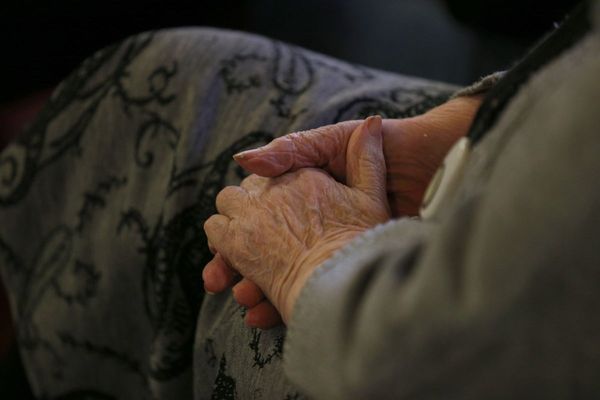
For Sean Dyche the road to salvation would begin at Rock City in Nottingham. Liberated from the treadmill of management for the first time in almost a decade after being sacked by Burnley, Dyche enjoyed his first weekend of freedom having drinks with friends before taking in a bill of Manchester tribute acts. Camera‑phone footage from Sunday night shows him swaying along to a band called The Clone Roses.
Which on reflection feels about perfect. Given everything else going on at the moment, we may not have been ready as a society for the idea of a sad Sean Dyche. Dyche’s year-long New York sabbatical. Dyche’s lonely, penitent pilgrimage to Santiago de Compostela. A tearful Dyche addressing his adoring public one last time from the steps of Burnley town hall, as mourners lay scarves and candles at his feet. Nobody wants any of this. Dyche grooving along to (Song For My) Sugar Spun Sister on a shaky camera phone: nature has healed.
Perhaps, on reflection, this was the defining motif of Dyche’s decade at Burnley: that striking point of difference, the absence of pretensions or affectations, elite football with a recognisably human face. Dyche never claimed to have all the answers, never obsessed over enemies and agendas, never pretended that football was any more serious than it is, never stopped joking about signing Lionel Messi. And in retrospect his departure represents the loss of something vital and tonal to this great glossy global entertainment product, something that may not be recovered in a hurry.
Seven years ago, when Dyche took Burnley down for the first time, it was basically fine. The club’s finances were in decent shape. There was patience and potential and a vision. You get relegated, you have another go. These days the revenue streams are too essential, the thirst for returns too urgent, the competition too unforgiving. The club is laden with debt, the football poor, the squad a mixture of the good enough, the once-good enough and the not-quite good enough. The end could quite conceivably have come sooner.
Naturally a good deal of mythologising nonsense will be talked about this Burnley team in years to come: that they were an ugly long-ball side, that they were dirty and ill-tempered, that the failure to refine or adapt their brutish style of football ultimately proved their undoing. Dyche himself feels ripe for caricature: the gravelly voiced, worm-eating dinosaur with the look of a nightclub bouncer and tactics to match.
The truth is that many of Burnley’s critics clearly did not watch them very much. Dyche always hated possession for its own sake, wanted his teams to get the ball forward, but he was not remotely fussed how they did it.

They could cut you open, skin you down the flanks or shock you with a counterattack. They have Aaron Lennon, Dwight McNeil and Maxwel Cornet. They have had two red cards in five seasons. Dyche himself is one of the most thoughtful and sincere coaches in the game, never more so than when standing up to his club’s own fans in 2020 for their racist “white lives matter” plane banner. Meanwhile he has been forced to rebuild almost an entire squad on a budget of about £750 while his owners load the club with takeover debt.
The problem was not that Burnley failed to evolve or adapt. The problem is that Burnley were Burnley: a cash-poor small-town club in a sea of nation-states and billionaire mercenaries, desperately trying to keep its head above water. There is a certain bitter irony in the fact that the man Dyche succeeded at Burnley is now one of the main architects of their downfall: Newcastle’s Eddie Howe, a manager often hailed as the archetype of the modern holistic young English coach, now playing fantasy football with Saudi Arabian money. Who, ultimately, was the principled one?
All of which simply embellishes the sparkling, visceral miracle of Peak Burnley, the house that Sean built, a team that felt like a doomed historical artefact almost from the moment it came into existence. And for all the condescension and metropolitan snobbery there was a real beauty to Peak Burnley, not perhaps the classical beauty of perfect curves and marble nudes but the industrial beauty of order and function, harmony and collective effort, 11 moving as one.
Its passing marks perhaps one of the last genuine attempts by a Premier League club to express its local identity through football itself. For better and worse one could feel Burnley, the town and its people, in the way its football team passed and tackled and ran and fought and went about its business. That connection will endure at a structural level, not least through Burnley’s impressive community department.
But it is hard to imagine there will ever be another elite team so thoroughly of its place, composed so overwhelmingly of British and Irish players, playing such distinctively local football. It is fine to feel happy or sad about this, by the way; or perhaps as binary as Dyche himself, tapping his toes to Fool’s Gold as he contemplates a career of Championship rescue jobs.
The world is connected and borders are fluid and money seeps in. And so, like Pulis’s Stoke and Allardyce’s Bolton and Curbishley’s Charlton, the era of Dyche’s Burnley has gone the way of all flesh. Do not mourn the fact that it died. Cherish the fact it lived.







